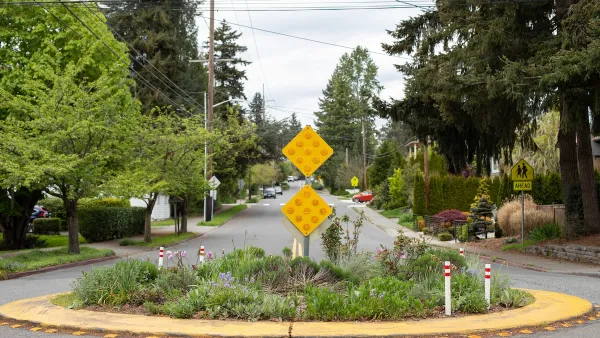Ten years ago, Chicago held a design competition for pedestrian bridges at five locations on the lakefront. As the projects have languished, so has improved access between neighborhoods like North Kenwood and Oakland to nearby Burnham Park.
Chicago Tribune Architecture Critic Blair Kamin checks in on the progress of the 35th Street Bridge, which crosses South Lake Shore Drive on the Southside of Chicago. The current derelict state of the bridge some big questions, according to Kamin: "Who gets what and when do they get it? Who's first in line for infrastructure that improves the quality of life and who has to wait? Are public works equitably distributed or, as D. Bradford Hunt and Jon B. DeVries concluded last year in their insightful book, 'Planning Chicago,' does politics distort planning?"
The slow pace of the $18.3-million project to rebuild the 35th Street Bridge is a conspicuous reminder of how best laid plans at equitable distribution of public works progress can end up proving that last point. "Ten years ago, there was optimism that these problems would be solved when Chicago held a design competition for pedestrian bridges at five lakefront sites, including North Avenue and 35th, 41st and 43rd Streets on the south shoreline. Residents of the mostly African-American North Kenwood and Oakland neighborhoods anticipated better access to nearby Burnham Park. So did developers building townhomes and apartment blocks in the reviving neighborhoods."
The 35th Street Bridge has, at various moments in time, been slated to begin construction in 2006, 2007…and 2009 and 2010….and again in 2013. Now the target date for completion is 2015.
"Meanwhile, it's unclear if the competition-winning designs for the curving pedestrian bridges at 41st and 43rd Street, by Chicago firm Cordogan Clark & Associates, will ever make the leap from renderings to reality. Designs for those spans are still being refined, and Scales said construction will start in the summer of 2015 'if all goes well.' Don't bet the farm on it."
FULL STORY: Pedestrian bridges leave dots unconnected

Planetizen Federal Action Tracker
A weekly monitor of how Trump’s orders and actions are impacting planners and planning in America.

Chicago’s Ghost Rails
Just beneath the surface of the modern city lie the remnants of its expansive early 20th-century streetcar system.

Amtrak Cutting Jobs, Funding to High-Speed Rail
The agency plans to cut 10 percent of its workforce and has confirmed it will not fund new high-speed rail projects.

Ohio Forces Data Centers to Prepay for Power
Utilities are calling on states to hold data center operators responsible for new energy demands to prevent leaving consumers on the hook for their bills.

MARTA CEO Steps Down Amid Citizenship Concerns
MARTA’s board announced Thursday that its chief, who is from Canada, is resigning due to questions about his immigration status.

Silicon Valley ‘Bike Superhighway’ Awarded $14M State Grant
A Caltrans grant brings the 10-mile Central Bikeway project connecting Santa Clara and East San Jose closer to fruition.
Urban Design for Planners 1: Software Tools
This six-course series explores essential urban design concepts using open source software and equips planners with the tools they need to participate fully in the urban design process.
Planning for Universal Design
Learn the tools for implementing Universal Design in planning regulations.
Caltrans
City of Fort Worth
Mpact (founded as Rail~Volution)
City of Camden Redevelopment Agency
City of Astoria
City of Portland
City of Laramie




























